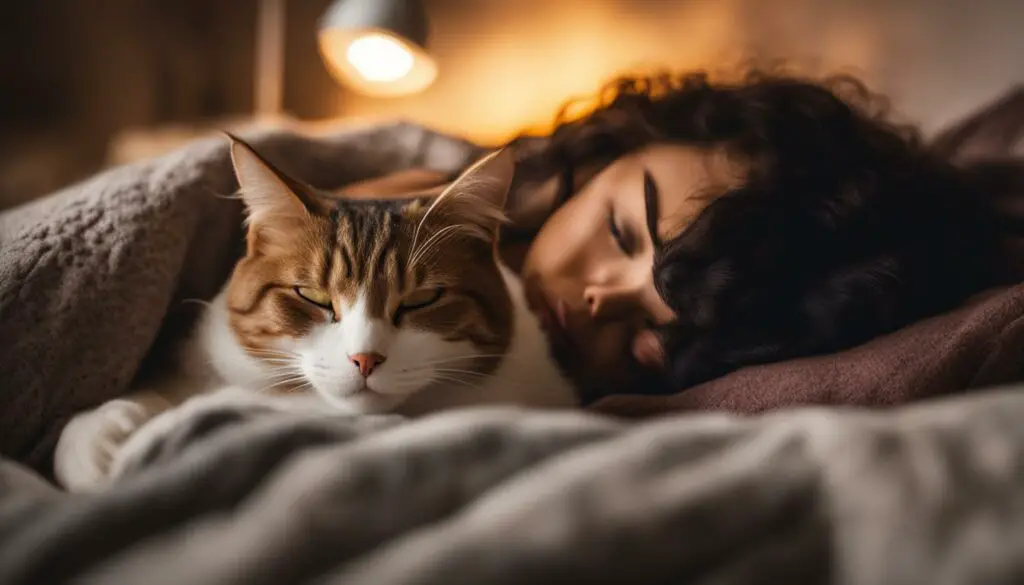Have you ever wondered why your cat insists on sleeping at your feet? Cats have unique sleeping habits that may seem mysterious to us. In this article, we will delve into the fascinating world of feline sleep patterns and explore why they choose to sleep with their owners. By understanding their behavior, we can strengthen the bond between us and our furry companions.
Cats are crepuscular animals, meaning they are most active during dawn and dusk and sleep for most of the day. Adult cats can sleep for up to 16 hours, while kittens can sleep for about 20 hours a day. Their sleep cycle consists of quiet sleep and active sleep stages, where cats move in and out throughout the day.
Cats sleep at your feet for several reasons, including seeking warmth and comfort, marking territory and ownership, and forming a bond with their owners. It’s a behavior rooted in their instincts and desire for companionship.
Key Takeaways:
- Cats are crepuscular animals, most active during dawn and dusk.
- They can sleep for up to 16 hours a day.
- Cats sleep at your feet to seek warmth, comfort, and mark their territory.
- This behavior helps them form a bond with their owners.
- Understanding cat sleep patterns can strengthen the bond between cats and their owners.
Understanding Feline Sleep Patterns
Cats have unique sleep patterns that contribute to their overall behavior and well-being. By understanding these patterns, cat owners can provide a comfortable and conducive sleeping environment for their feline companions.
Cats have a high metabolism, which allows them to sleep for long periods. They have a sleep cycle that consists of two stages: quiet sleep and active sleep. During quiet sleep, cats are in a deep sleep and show minimal movement. This is when they experience deep rest and rejuvenation. Active sleep, also known as REM sleep, is characterized by rapid eye movement and increased brain activity. During this stage, cats may twitch, purr, or even vocalize as they dream.
The amount of sleep a cat needs varies depending on various factors such as age, health, and activity level. On average, adult cats sleep for about 16 hours a day, while kittens can sleep up to 20 hours a day. Older cats and those with certain medical conditions may require even more sleep. Adequate and quality sleep is vital for a cat’s physical and mental well-being.
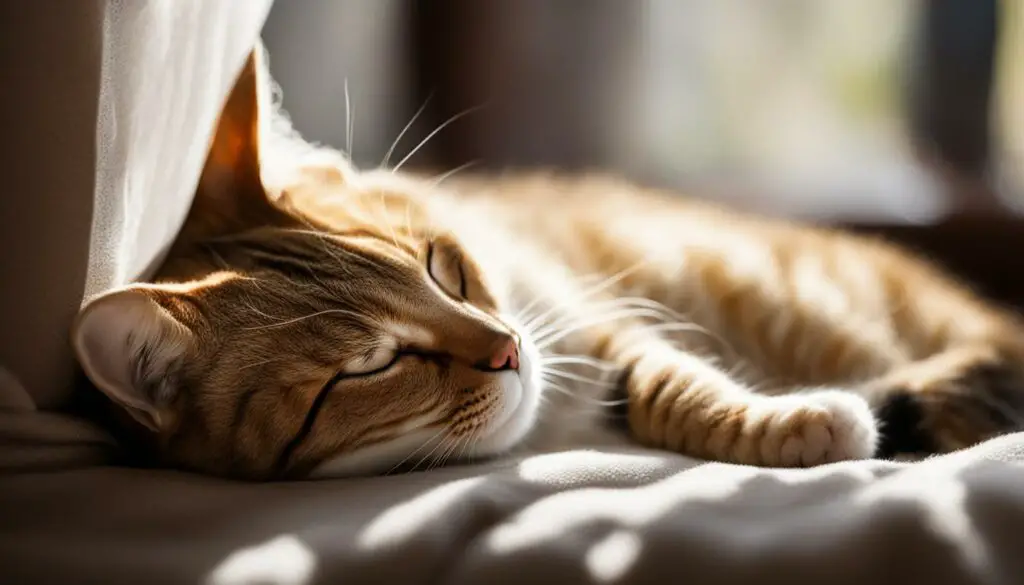
The Bond Between Cats and Their Owners
Cats are not only independent creatures, but they also form strong bonds with their owners. The bond between cats and their owners is a unique and special relationship that is built on trust, affection, and companionship. Sleeping close to their owners is one of the ways cats show their love and loyalty.
Research has shown that cats have a similar attachment style to humans as infants do with their parents. They can become distressed when their owners are not around and seek comfort from them when they return. Sleeping at your feet is another way for cats to mark their territory and create a sense of security and familiarity in their environment.
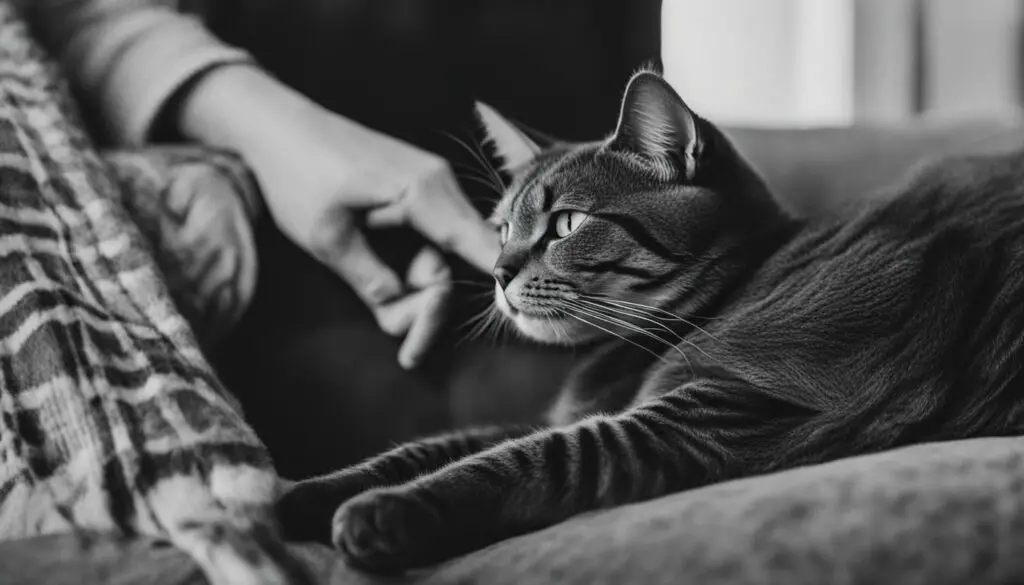
There are several reasons why cats choose to sleep at their owner’s feet. One reason is seeking warmth and comfort. Your feet provide both, making it an ideal spot for them to curl up and relax. Cats also sleep at your feet for social interaction and affection. They enjoy your company and crave attention, so sleeping close to you helps establish a bond and provides comfort and relaxation for both you and your cat.
In summary, the bond between cats and their owners is a special connection that is built on trust and affection. Sleeping at your feet is one of the ways cats show their love and loyalty. Understanding and nurturing this bond is essential for the well-being of both you and your feline friend.
Reasons Cats Sleep at Your Feet
There are several reasons why cats choose to sleep at their owner’s feet. One of the main reasons is seeking warmth and comfort. Cats are naturally attracted to warm areas, and our feet provide both warmth and a cozy sleeping spot for them. Sleeping at your feet allows cats to stay warm and feel safe and comfortable throughout the night.
Another reason why cats sleep at your feet is for protection and security. By sleeping at your feet, cats can keep an eye on you and be alerted to any potential dangers. This behavior is more common in outdoor cats that are used to being on the lookout for predators. Sleeping close to you offers them a sense of security and helps them feel safe in their surroundings.
In addition to seeking warmth and security, cats also choose to sleep at your feet for social interaction and affection. Cats are social creatures and enjoy the company of their owners. Sleeping close to you helps them establish a bond and provides them with comfort and relaxation. By sleeping at your feet, they can be close to you and receive the attention and affection they crave.
| Reasons Cats Sleep at Your Feet |
|---|
| Seeking warmth and comfort |
| Protection and security |
| Social interaction and affection |
Overall, cats sleep at your feet for various reasons, including warmth, protection, and bonding. Understanding their behavior can help you provide a comfortable and safe sleeping environment for your feline companion, promoting a stronger bond between you and your cat.
Other Common Feline Sleeping Behaviors
Aside from sleeping at your feet, cats exhibit several other sleeping behaviors that may seem unusual but are perfectly normal. Understanding these behaviors can help you provide a safe and comfortable sleeping environment for your furry friend.
Sleeping on Your Chest or Lap
One common behavior is sleeping on your chest or lap. This is a sign of relaxation and trust. Your cat feels safe and comfortable in your presence and enjoys the warmth and security that your chest or lap provides. It’s a way for them to bond with you and show affection.
Sleeping in Unusual Places
Cats are known for their ability to find cozy and safe spots to sleep. You may find your cat sleeping in unusual places like the top shelf of a bookcase or inside a laundry basket. These places offer a sense of security and allow your cat to observe their surroundings while feeling protected.
The “Cat Loaf” Position
Another common sleeping position is the “cat loaf” position. This is when cats tuck their paws under their body and curl up. It’s a sign of comfort and security. By curling up, cats are able to conserve body heat and feel more protected.
| Sleeping Behavior | Description |
|---|---|
| Sleeping on Your Chest or Lap | A sign of relaxation and trust. Your cat feels safe and comfortable in your presence and enjoys the warmth and security that your chest or lap provides. |
| Sleeping in Unusual Places | Cats find cozy and safe spots to sleep. They may choose to sleep in places like bookshelves, laundry baskets, or even cardboard boxes. |
| The “Cat Loaf” Position | This is when cats tuck their paws under their body and curl up. It’s a sign of comfort and security. |
It’s important to understand these sleeping behaviors to provide a comfortable and safe sleeping environment for your cat. By recognizing their preferred sleeping positions, you can ensure that they have the space and comfort they need to get a good night’s sleep.
Remember, every cat is unique, and their sleeping preferences may vary. Paying attention to their behavior and providing a variety of sleeping options, such as cozy beds and warm blankets, will help keep your feline companion happy and well-rested.

How to Encourage Healthy Sleep Habits in Your Cat
Creating a comfortable and conducive sleeping environment for your cat is essential for promoting healthy sleep habits. Here are some tips to help you encourage your feline friend to get the restful sleep they need:
1. Provide regular playtime:
Engaging your cat in interactive play sessions during the day can help tire them out and expend excess energy. Schedule playtime sessions before bedtime to help establish a bedtime routine and promote better sleep.
2. Establish a comfortable sleeping area:
Make sure your cat has a soft and cozy spot to sleep in. Provide a comfortable bed or blanket in a quiet location away from any disturbances. Consider placing a perch near your bed so that your cat can sleep close to you, if that is their preference.
3. Use treats and positive reinforcement:
Make bedtime a positive experience by using treats or catnip to entice your cat into their sleeping area. Reward their presence with praise or small treats to reinforce the habit of sleeping in their designated spot.
4. Ensure basic needs are met:
Make sure your cat has access to fresh water, food, and a clean litter box. Meeting their basic needs will help them feel safe and secure, contributing to better sleep quality.
| Benefits | Downsides |
|---|---|
|
|
By following these tips, you can encourage healthy sleep habits in your cat and ensure they get the rest they need to stay happy and healthy.
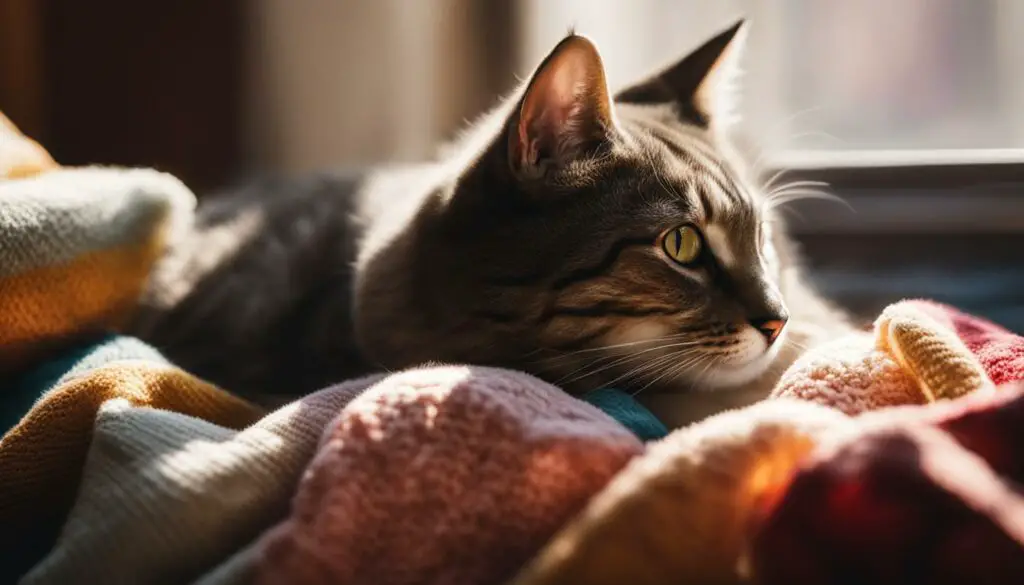
Benefits of Sleeping With Your Cat
Sleeping with your cat can be a wonderful experience that brings numerous benefits to both you and your furry friend. The bond between a cat and its owner is strengthened when they share sleeping space, creating a sense of companionship and comfort.
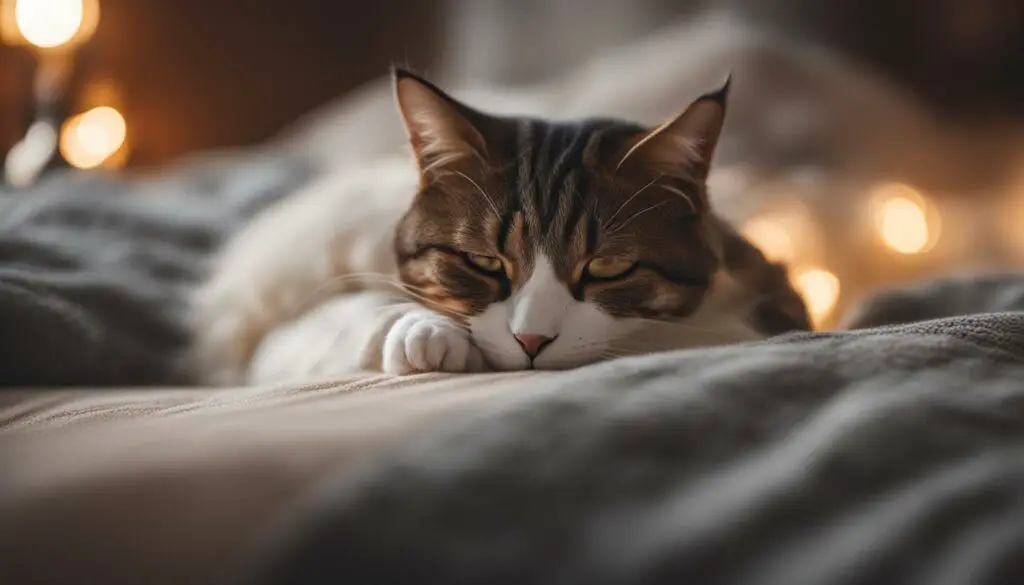
One of the main advantages of sleeping with your cat is the calming effect it can have on your mental state. Pets, including cats, have been shown to reduce feelings of loneliness and anxiety, providing a sense of emotional support. The presence of a sleeping cat can help you relax and unwind, promoting a peaceful sleep environment.
Sleeping with your cat also promotes bonding and strengthens the relationship between you and your feline friend. Sharing a sleeping space allows for increased physical contact and affection, which can deepen the sense of trust and love between you. The warmth and comfort provided by your presence can make your cat feel safe and secure, resulting in a more contented and relaxed pet.
Additionally, there are physiological benefits associated with sleeping with your cat. Studies have shown that sleeping with pets can lower blood pressure and improve overall psychological well-being. The rhythmic sound of your cat’s breathing and purring can have a therapeutic effect, helping you fall asleep faster and enjoy a more restful night’s sleep.
Benefits of Sleeping With Your Cat
- Calming effect: Sleeping with your cat can reduce feelings of loneliness and anxiety, providing emotional support.
- Bonding and companionship: Sharing a sleeping space strengthens the relationship between you and your cat, promoting trust and love.
- Physiological benefits: Sleeping with pets can lower blood pressure and improve overall psychological well-being.
Quote:
Sleeping with my cat has been one of the best decisions I’ve made. It brings me comfort and helps me feel more relaxed at night. Plus, waking up to a purring ball of fur is the perfect way to start the day!” – Cat owner
While there are numerous benefits to sleeping with your cat, it’s essential to consider any potential downsides, such as disruptions to your sleep and the risk of allergies. Each person’s circumstances and preferences are unique, so it’s important to weigh the pros and cons before deciding whether to share your sleeping space with your feline companion.
Downsides of Sleeping With Your Cat
Sleeping with your cat can be a cozy and comforting experience, but it’s important to consider the potential downsides. While cats bring joy and companionship, there are a few factors to keep in mind before inviting your feline friend into bed.
Allergies and Respiratory Sensitivities
One of the main concerns of sleeping with your cat is the risk of allergies and respiratory sensitivities. Cats produce allergens that can trigger allergic reactions in some individuals, including sneezing, itchy eyes, and congestion. If you already have allergies or asthma, sleeping with your cat can exacerbate these symptoms and make it difficult for you to get a good night’s sleep.
Furthermore, cats can carry allergens from the litter box on their paws, which can spread throughout your bed. This can increase your exposure to allergens and pose a risk to your respiratory health, especially if you have a weakened immune system.
Disruptions to Sleep
While cats are known for their independent and solitary nature, they can also be quite active at night. Cats are crepuscular animals, meaning they are most active during dawn and dusk. This can lead to disruptions in your sleep as your cat may scratch at the bed, play with toys, or simply demand attention during the night.
Additionally, cats are known for their kneading behavior, where they use their paws to push in and out against a soft surface. This behavior can cause discomfort and disturbances, especially if your cat prefers to knead on your body while you’re trying to sleep.
Parasites and Bacterial Infections
Cats are natural hunters and explorers, which means they can come into contact with parasites and bacterial infections. If your cat spends time outdoors or interacts with other animals, there is a risk that they may bring home fleas, ticks, or other external parasites that can infest your bed and pose a health risk to both you and your cat.
Additionally, cats may carry bacteria such as Bartonella henselae, the bacterium that causes cat scratch fever. This bacterium can be transmitted through scratches or bites, and while it is rare, it’s important to be aware of the potential risk if you choose to sleep with your cat.
| Downsides of Sleeping With Your Cat | |
|---|---|
| Allergies and Respiratory Sensitivities | Increased risk of allergies and respiratory sensitivities due to cat allergens and litter box debris. |
| Disruptions to Sleep | Potential disturbances caused by a cat’s nighttime activity, scratching, kneading, and demands for attention. |
| Parasites and Bacterial Infections | Risk of exposure to external parasites and bacterial infections carried by cats, especially those that spend time outdoors. |
Conclusion
Understanding why cats sleep with you is key to nurturing the special bond between you and your feline companion. Cats often choose to sleep at your feet for various reasons, including seeking warmth and comfort, marking their territory, and forming a strong connection with their owners. To ensure your cat’s well-being, it’s essential to create a cozy and safe sleeping environment, provide regular playtime, and establish a bedtime routine.
Sleeping with your cat can have numerous benefits, such as a sense of calm and stress relief. It also promotes bonding and strengthens the relationship between you and your feline friend. However, it’s important to consider the downsides, including potential disruptions to your sleep and the risk of allergies or exposure to parasites and bacterial infections.
In the end, the decision to sleep with your cat depends on your personal preferences and circumstances. If you choose to share your bed with your furry companion, enjoy the warmth, companionship, and unconditional love that comes with it. Remember to prioritize both your sleep and your cat’s well-being, ensuring a harmonious and cozy environment for restful nights together.
FAQ
Why do cats sleep at their owner’s feet?
Cats sleep at their owner’s feet for several reasons, including seeking warmth and comfort, marking territory and ownership, and forming a bond with their owners.
How many hours a day do cats sleep?
Adult cats can sleep for up to 16 hours, while kittens can sleep for about 20 hours a day.
What is the sleep cycle of a cat?
Cats have a sleep cycle consisting of quiet sleep and active sleep stages, where they move in and out throughout the day.
What are some other common feline sleeping behaviors?
Other common feline sleeping behaviors include sleeping on your chest or lap, sleeping in unusual places, and the “cat loaf” position.
How can I encourage healthy sleep habits in my cat?
You can encourage healthy sleep habits in your cat by providing regular playtime during the day, setting dinner time later in the evening, and creating a comfortable sleeping environment.
What are the benefits of sleeping with my cat?
Sleeping with your cat can provide a calming effect, help relieve stress, promote bonding, and improve overall psychological well-being.
Are there any downsides to sleeping with my cat?
Some downsides to sleeping with your cat include potential disruptions to your sleep, exposure to litter box debris, and a higher risk of allergies or asthma.
Should I let my cat sleep with me?
Whether or not you let your cat sleep with you depends on your personal preferences and circumstances.

